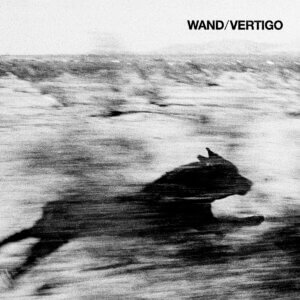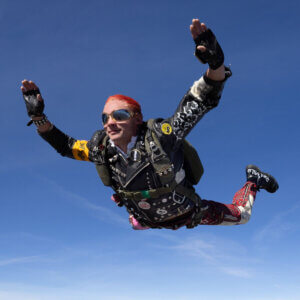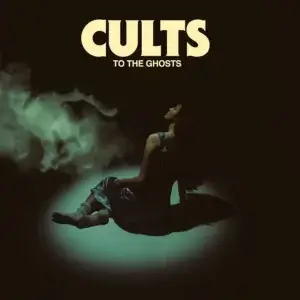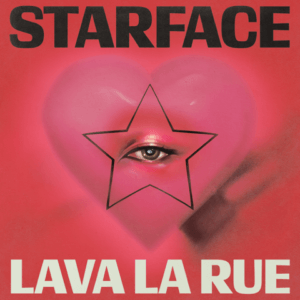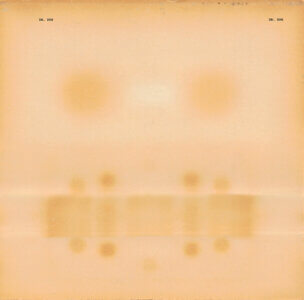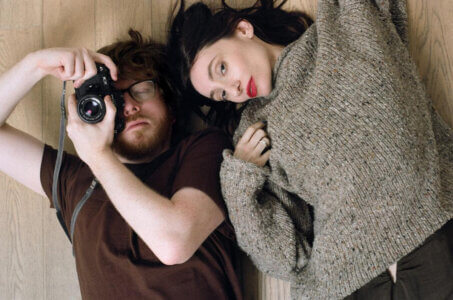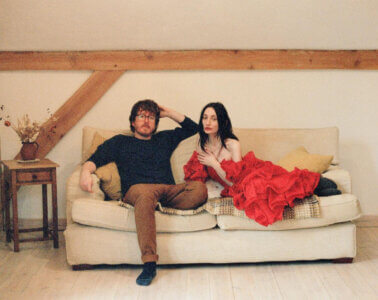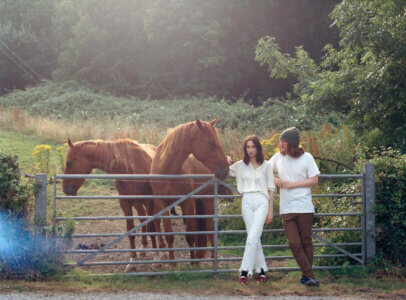King Hannah’s Reign Continues on Superb Second Record
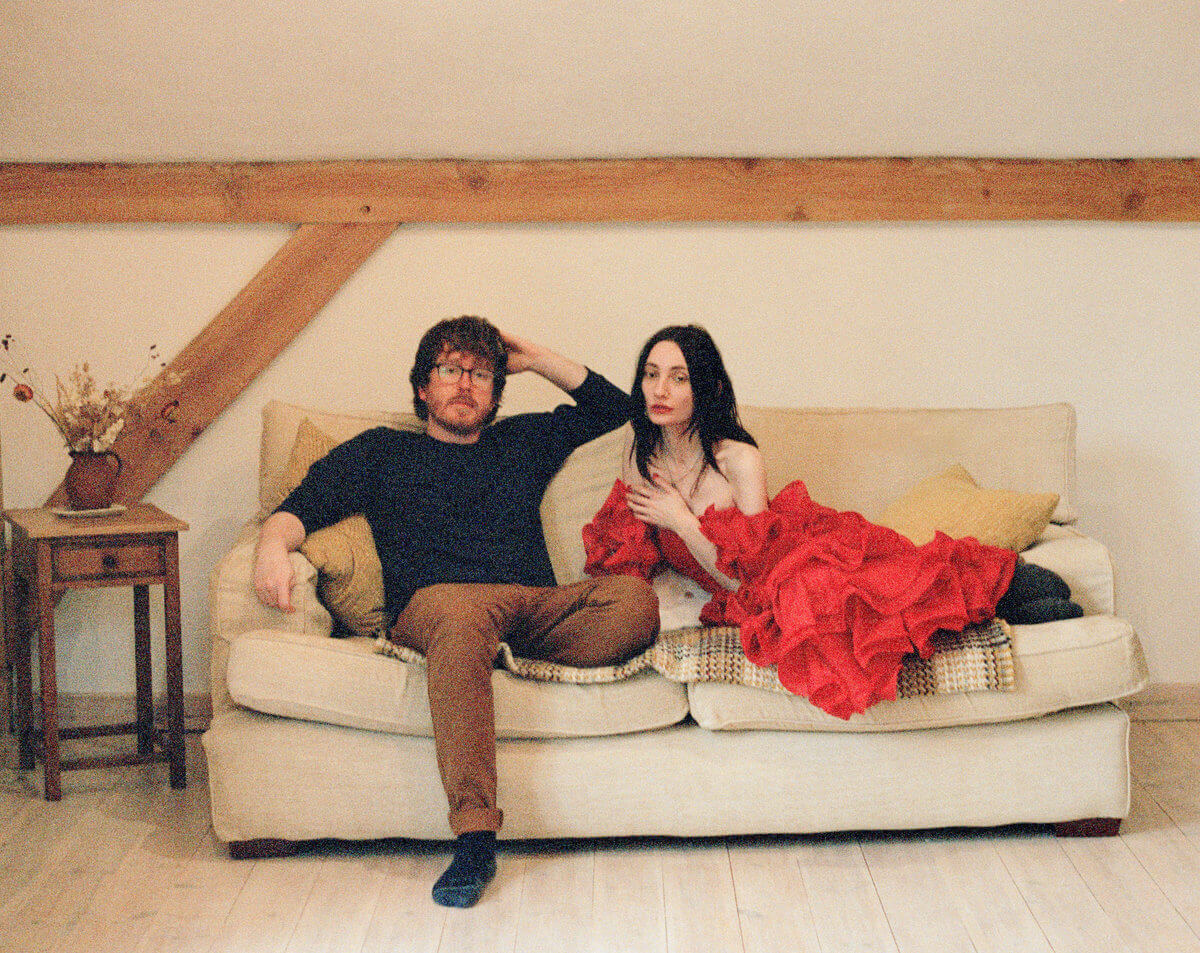
On Big Swimmer, the long-awaited second record from Liverpool-based duo King Hannah, Hannah Merrick and Craig Whittle graciously grant their audience access to their travel diaries of the North American leg of their tour and allow us to be a fly on the kitchen wall while a roast dinner is being prepared. There’s a tremendous amount of scope in their latest body of work, lyrically and sonically, and yet they retain an intimacy through the minute detail across their lyrics which are wryly delivered by Merrick. A bridge between both records is King Hannah’s propensity for brilliantly meandering and enveloping instrumentation. Going back to their critically acclaimed debut record, I’m Not Sorry, I was Just being Me, the pair have been inspired by film scores and detailed settings which have shaped their cinematic sonic sensibilities to great effect, drawing the listener closer and closer to their captivating songs.
Over Zoom, Merrick and Whittle spoke to Northern Transmissions about their different approach to recording their second album, collaborating with Sharon Van Etten and they share their favorite Bill Callahan songs.
NT: Big Swimmer is out very soon, these are the last few days where the album belongs to the two before everyone else. How’re you both feeling?
Craig Whittle: I always feel like once you’ve finished, once you’ve stopped recording, that’s when the slow process of it not being yours begins.
Hannah Merrick: I remember this last time, as well. I remember people saying this sort of thing and not really feeling anything. Now, I feel the same. I think it’s because it hasn’t really hit me at all yet. But I remember last time, it really hits you that your album’s out and that everyone can access it and they’ll either like it or not when you’re touring and playing the shows. I think it’s the same this time around, it just hasn’t really sunk in yet.
NT: How did you find the process of making album two? What were some of the differences between recording your debut I’m Not Sorry, I Was Just Being Me and Big Swimmer? An obvious difference, to my mind, is the timeframe; you can take as much time as you want for a debut but there’s a smaller window for the follow-up and there can be an element of pressure when the debut has been well received.
CW: Yeah, we definitely felt a little bit more pressure doing this one, didn’t we? It was internally, where the pressure came from, because you want to show that you’re getting better and you need to evolve the sound a little bit but you don’t want to alienate the people who have liked what we’ve done. We’ve been writing songs for seven or eight years and our music tastes have changed a lot. The new music has to reflect the music that we listen to now and are into and excited by. But, you know, you have a sound that people are used to. So it was quite difficult, wasn’t it?
HM: Yes, it was all about getting that balance. You need to make sure that you’re happy with it but you’re also aware that there’s a lot of other people that you’ve got to please as well.
NT: You worked with Ali Chant, who produced Big Swimmer with you. What was that experience like? Were there any particular techniques or approaches you adopted that you’ll carry into the next body of work you make?
HM: We loved Ali Chant! The studio environment was perfect for what we were after because we’ve never recorded in that way before and we had a really small window to actually record the album itself. Which again, that was something that was brand new for us because the last album took six months or something to record. We went from six months to two weeks, it was a huge step but we love it and we want to do it the same way next time.
CW: Yeah, because this time we made multiple demos of songs in the practice room. We’d set up microphones and did our own little versions of tracks to see what worked so that by the time we got into the studio we knew what was going to work and we’d already eliminated certain songs that weren’t quite right which we’d never done before. Then everything was recorded pretty much live. It was all done in one room and we really wanted to capture the feeling of us playing together with people on the record. We’ve always tried to do that in the past but have never really been able to because of the size of the room and other certain things.
HM: I think as well, in the past, we wouldn’t have necessarily had the confidence to fully throw ourselves into that, either.
CW: Yeah, because in the past we added things, maybe unnecessary things, like layers of synths or certain effects. On this record, your vocals are a lot drier, there’s less reverb. I think in a lot of ways, yeah, we were definitely more confident making this record.
NT: You mention recording the new material live and certainly there’s a quality to the arrangements, especially in the extended instrumental outros, that has that enveloping feeling of watching a band riffing away on stage. It’s something that makes you feel like you’re in the venue when you’re listening to the record. You toured a lot following the release of your debut, was there ever a period where you were workshopping songs that eventually made it on to Big Swimmer in your sets and testing them out in front of audiences?
HM: We did it with the first album. We didn’t have these songs at that point to test them out. We didn’t get to test out new material at all, really.
CW: No, we played one in soundcheck once and that was as far as we went! We spoke about that quite a lot, the idea of throwing songs in here and there, but I think maybe if those songs hadn’t gone down so well in that moment, maybe that would have colored our opinion on them. I’m kind of glad that we didn’t do it, in a way, because obviously nobody knew those songs so the reaction from the crowd is going to be a certain way and if we’d have fucked up or played them a bit weird, I feel like that would have made us not love a song as much, maybe? I don’t think they were ready at that point to be played.
NT: Craig, I know that when you were writing for King Hannah’s debut, you listened to a lot of film scores and soundtracks. You’ve mentioned that both of your tastes have evolved and changed between records. What were some of the reference points you came into this album with?
HM: We moved a lot more onto country music.
CW: Yeah, there’s definitely a country element to the album.
HM: Yeah, a lot more than the last time. Then a lot of Built To Spill sort of stuff this time around, as well.
CW: Yeah, I mean, I think we watched the same kinds of films so that’s always there. I think the biggest difference between from when we wrote the first album, during Lockdown before we’d toured or anything, to then writing Big Swimmer which is like 150 shows later or so, and from the people we met and the music we’ve gotten into from meeting lots of interesting people who were like, ‘Oh, you remind us of this band, you should listen to them’. We had so many moments where we were like, ‘Oh my God, we don’t really know this band’s music at all.’. We thought we had this mad repertoire of music that we were into but we felt like we didn’t know anyone! So, yeah, bands like Built To Spill, Slint and all these cool underground bands. Fugazi, as well, were a big one we got into during that time. That feels like the biggest shift, listening to those bands and I think that colored the record in a different way.
NT: Yeah, interesting. Big Swimmer, sonically and lyrically, is a much darker album compared to King Hannah’s debut. On this record, many of the songs chronicle your time on tour, the song “Milky Boy (I Love You) comes to mind. While you were on the road and traveling through so many different cities, how conscious were you of your surroundings, what you were hearing and seeing, for material to turn into songs? Were you journaling or making a lot of notes while you were on tour?
HM: We didn’t look out for stories. None of it was like, ‘Oh, that’ll make a good story!’. It was only afterwards that the stuff that’s stuck in your mind makes you know what would work. When you get home after being away, that’s typically when it comes to light, but you’re not sourcing stories as you’re going along. The whole thing was just so different to what we know and you can’t help but take the whole thing on and be completely swamped by it all.
NT: With your lyrical style, there’s an immediate accessibility to the worlds you create within songs. I think of “John Prine On The Radio” which is you cooking a roast chicken dinner while listening to the radio. It’s a habitual scene that most people take for granted and not consider that you can have a magical moment in those simple acts and everyday occurrences. What is it about those moments that inspires you to capture those moments?
CW: Well, I think that the most mundane things that happen are the most beautiful things, aren’t they? There’s maybe also an element of being away on tour so much, during that time we did talk about having a roast dinner quite a lot! You’d be like, ‘Oh, I can’t wait to make a roast dinner,’ because you just don’t get to do that when you’re on tour. I think we’ve always been inspired by these everyday kinds of things, I don’t know what it is. Perhaps it’s the kind of films that we like? I remember even with the EP or maybe it was the album when we were inspired by Raymond Carver and his style of writing which is very minimal. And you know, capturing very normal moments happening to normal people. There’s an element of these crazy moments in America that inspired Big Swimmer, but then also these super quiet moments. That’s the blend of the album.
HM: I don’t know if this is true for you, but personally, I feel like it comes to me easier to write about stuff like that than it does to write about feelings. I don’t write about feelings, I’m more interested in stories. That’s just my way of doing it. I think it’s because you can picture it and then there’s something there to focus on. I find it easier, well not easier. It’s not easy at all, but I find that I naturally go to that. Then I say, sitting down and thinking ‘How am I feeling today? Or how do I feel about this person? How do I feel about this person?’ That’s just my personal way of doing it.
CW: And also, I guess it’s the music you listen to, like Bill Callahan and John Prine. They’re very visual songwriters. They put you in a moment.
HM: Yeah, and we really love literature and in films, as well, when it’s really all about the visuals within them and there being as much detail as possible.
NT: Speaking of Bill Callahan, he also gets a shout out in the opening lines of “Suddenly, Your Hand”. You say there that he’s someone you listen to, what are your go-to Bill Callahan records or songs?
HM: The one I’ve listened to most is Gold Record, so that’s going to be my favorite. Oh, it’s hard isn’t it to pick a song. Craig, what’s your favorite one?
CW:My favorite album is probably A River Ain’t Too Much To Love, it’s a Smog album. I feel like that was the start of his shift into new-old, reflective Bill Callahan and a little less angry Bill Callahan!
HM: Okay, let’s choose a song from Gold Record. “Let’s Move To The Country” is really good. I’ve always liked “Protest Song”, Itoo, I don’t know why but I do. It’s so hard to pick just one, they’re all so good!
CW: There’s a line in one of his songs from one of the later records where, and again, it’s that change from him being young and angry to now, where he’s like getting older and a family man, and he sings, “The panic room is now a nursery”. It’s also such a small amount of words, too. It’s so clever. It just gets across so much about getting older and how you change and your priorities and life changes. Yeah, he’s a master.
NT: Sharon Van Etten has become a patron saint of King Hannah. Back in 2020, she loved your single “Crème Brûlée” and now, four years later, she features as a special guest on two songs on Big Swimmer. How did the collaboration come about? Were you nervous approaching her to do it?
HM: In the “Crème Brûlée” days, we had exchanged emails with her then and we were like, ‘Oh, let’s work together at some point’. Then, a little later on, we just emailed her. At the very, very sort of start, of making this album, we were emailing her demos every now and then as we were doing them. Then she’d email back and be like, ‘Yeah, that’s cool!’ We ended up sending her the demos nearer the end of the process and she chose “Big Swimmer” and “This Wasn’t Intentional” to be on. It was actually quite an easy process, you know. It was quite fluid and she was really complimentary of everything and really willing to get stuck in and she seemed like she wanted to be on them and help in any way she could.
CW: Yeah, because she didn’t have to be on them! She was so, so lovely. She’s exactly how you’d expect her to be. She’s just so kind and really wanted us to be happy with what she had done. And I guess she was a bit nervous, in a very endearing way, and we were like, ‘Don’t be nervous! You’re Sharon van Etten!’
She recorded her vocals in her garage in America and then sent them over so it was all very in line with the general ethos of the album being very homely and having a DIY feel. It was really great.
NT: Finally, is there a particular lyric from Big Swimmer that encapsulates the last four years for King Hannah and feels poignant to you both now ahead of the record coming out?
CW: It’s got to “Big Swimmer”, doesn’t it?
HM: “Big Swimmer” is what came to my head straight away.
CW: Yeah, because “Big Swimmer” was the last song we finished recording. Hannah actually didn’t really want it on the album and I was like, ‘Oh, you’ve got to have it on the album!’.
NT: Really? You didn’t want it on the album?
HM: No!
CW: She didn’t even want to show it to the band. It was only in the last practice before we went into the studio and I said, ‘You have to show it!’. Now it’s funny because it’s your favorite song.
HM: Oh, I love it. The reason I didn’t want it on is because I sing songs like that all the time. I love singing like that, I sing like that around the house. It’s like singing, I really love to sing. But when I write, it’s a bit more angry and a bit more like what you hear in “Somewhere Near El Paso” and “Milky Boy (I Love You)”. And so, I just thought that “Big Swimmer” sounded so different from everything else. I wondered whether it was too singy and too sweet? Is it too nice and happy? I could hear it was a good song, but I didn’t think it was quite right. And I knew Craig would love it so I was so hesitant to show it to him because I knew he’d make me do it. Then I thought, well, he’s got good taste in music. If he thinks it’s right, it’s probably right. He’s not right all the time, though!
CW: I was right about that one! I think it’s quite poignant because of what it’s about, the metaphor behind it, but also because it nearly didn’t make the album and now it’s kind of made the album.
HM: Well, it is the album. The album is all about swimming big.
CW: It’s just funny that it nearly wasn’t on it and now it’s the album title and the message and everything.
Pre-order Big Swimmer HERE.
Latest Reviews
Tracks
Advertisement
Looking for something new to listen to?
Sign up to our all-new newsletter for top-notch reviews, news, videos and playlists.
